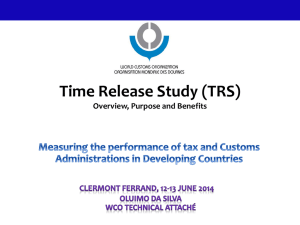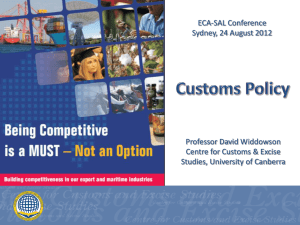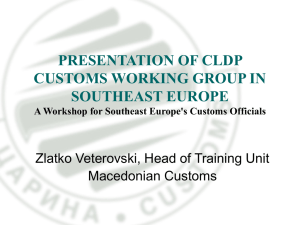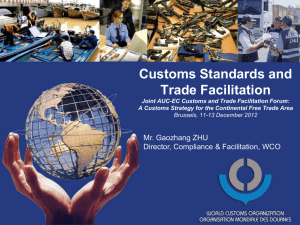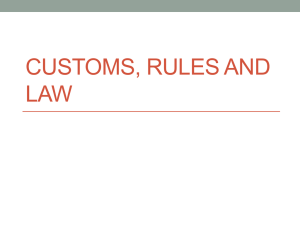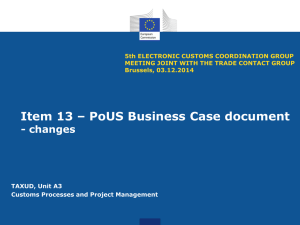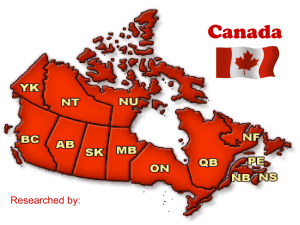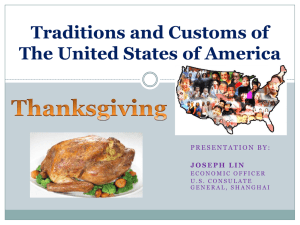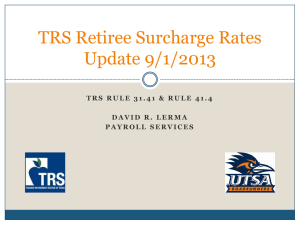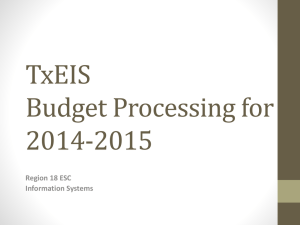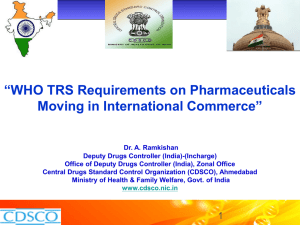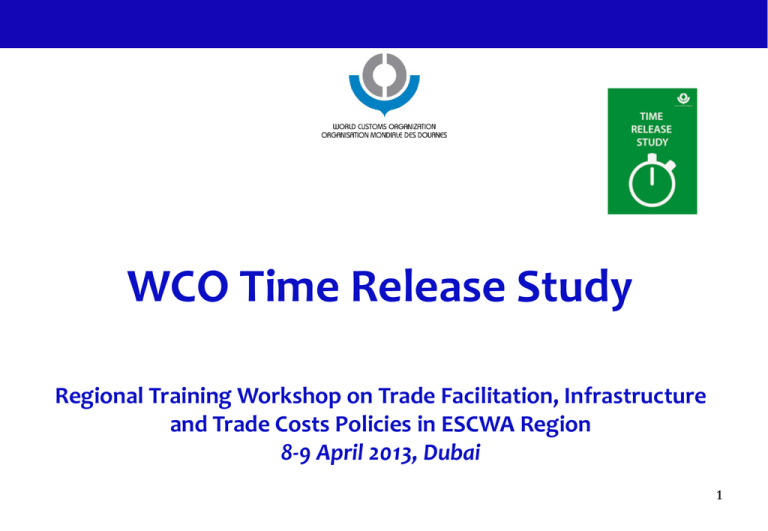
WCO Time Release Study
Regional Training Workshop on Trade Facilitation, Infrastructure
and Trade Costs Policies in ESCWA Region
8-9 April 2013, Dubai
1
Outline
What
is a TRS
Objectives
TRS
of a TRS
Version 2
Study
results
Lessons
learned
Challenges
Copyright © 2013 World Customs Organization. All rights reserved.
2
What is the TRS?
The WCO Time Release Study (TRS) is a unique tool and method
for measuring relevant aspects of the effectiveness of operational
procedures that are carried out by Customs, other regulatory
actors and the business involved in the standard processing of
imports, exports and in transit movements. It seeks to accurately
measure these elements of trade flows so that related decisions
to improve such performance can be well conceived and thereby
carried out.
Copyright © 2013 World Customs Organization. All rights reserved.
3
Copyright © 2013 World Customs Organization. All rights reserved.
4
WCO TRS Guide
1994 WCO TRS Handbook
2001 WCO TRS Guide
2005 WCO TRS Software
2011 WCO TRS Guide Version II
5
Copyright © 2013 World Customs Organization. All rights reserved.
Objectives of the TRS:
a) Identifying bottlenecks in the international supply chain
and/or constraints affecting Customs release
b) Assessing newly introduced and modified techniques,
procedures, technologies and infrastructure, or administrative
changes
c) Establishing baseline trade facilitation performance
measurement
d) Identifying opportunities for trade facilitation improvements
e) Estimating the country’s approximate comparative position as
a benchmark tool
Copyright © 2013 World Customs Organization. All rights reserved.
6
Image of the TRS
Sea cargo & Air cargo
Pre-arrival
Arrival
Lodgement of Vessels, Unloading
Declaration Aircrafts
Placing
goods to
Customs
Area
Intervention
Trade related
Agencies
Registration
Duty Payment Release
Goods
Declaration Examination Clearance
Customs Procedures
Port Authority
Procedure
Warehouse
Procedure
Trade Agency
Intervention
CY Procedure
TOTAL TIME from Arrival to Release of Goods
Copyright © 2011 World Customs Organization. All rights reserved.
Business
7
TRS Guide Version 2
as an affective support for Customs in the 21st Century
Key Objective
-
To bring in line with the growing challenges :
Coordinated Border Management
Customs to Business Partnership
Customs to Customs Cooperation
Export Controls
8
Copyright © 2013 World Customs Organization. All rights reserved.
Structure of the TRS Guide Version 2
1. Introduction
2. Background
3. General Purpose and Scope
4. Possible Specific Uses for the
Study Results
5. Outline of the TRS
6. Challenges and Opportunities
Appendices:
1. The Working Group
2. Simplified Survey Questionnaire Form
3. Detailed Survey Questionnaire Form
4. A Basic Guide to the Use of the WCO
TRS Online Software
5. Model Final Report Format
6. Model Press Release
7. The TRS in Exportation
8. National Practices
9
Copyright © 2013 World Customs Organization. All rights reserved.
TRS Process in General
Phase 1: Preparation of the Study
Establishment of a TRS Working Group
Determination of scope and design of the study
Planning and detailed methodology
Detailed Drawing plan
Sampling
Developing a survey questionnaire form
Test-Run
Phase 2: Collection & Recording of Data
Phase 3: Analysis of the Data & Conclusions
Analysis of the results of TRS and formulations of action plan
Finalizing TRS report and Press Release
Copyright © 2013 World Customs Organization. All rights reserved.
10
Study Results
Will assist administrations to :
Identify the constraints affecting customs/other agencies
clearance
Consider corrective actions
Identify areas requiring simplification in procedures
Establish Client Charters/Customs standards
Copyright © 2013 World Customs Organization. All rights reserved.
11
Possible Outcomes
Restructuring within the Administration
Draft or modify Customs or related Legislation
Simplify Customs procedures
Automate Customs procedures
Simplify other related procedures
Reallocate resources
Support requests for resources
Initiate measures to improve enforcement or detection
Resolve matters with other Agencies/Partners involved in the
clearance of goods
Provide basis for Single Window/Integrated Border Management
Copyright © 2013 World Customs Organization. All rights reserved.
12
Lessons Learned (1/2)
The WCO has been involved in several TRS
The methodology is easy to use, is suitable to all modes of
traffic
No special training is needed (except for need of a
statistician)
Analysis of data easily leads to development of action plans
Effective tool for measuring consequences of
policy/procedural change
Copyright © 2013 World Customs Organization. All rights reserved.
13
Lessons Learned (2/2)
Release times have actually reduced
To be effective, TRS must include all stakeholders
To be effective TRS must have strong management
commitment and supervision
TRS can be conducted without the need of outside resources
TRS is relatively inexpensive to conduct
Copyright © 2013 World Customs Organization. All rights reserved.
14
Challenges
Real management commitment (Dedicated team – mgt
understanding of time commitment)
Commitment of other agencies
Commitment of private sector stakeholders
Commitment of staff
Honesty in reporting and physical layout of facility
Public relations
Copyright © 2013 World Customs Organization. All rights reserved.
15
Thank you for your kind attention
For more information, please visit
the WCO Web site: www.wcoomd.org
Milena Budimirović
Technical Officer
Compliance and Facilitation Directorate
World Customs Organization (WCO)
milena.budimirovic@wcoomd.org
WCO, Brussels
16

